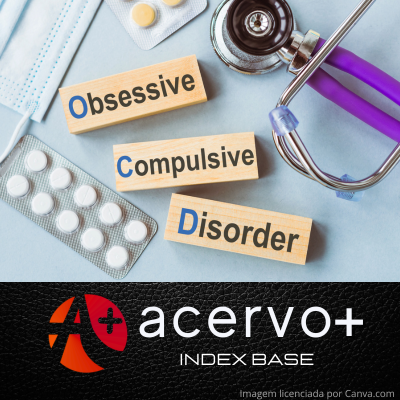A relação da pandemia da Covid-19 com o agravo à saúde em portadores de Transtorno Obsessivo-Compulsivo e o surgimento de novos casos
##plugins.themes.bootstrap3.article.main##
Resumo
Objetivo: Entender o impacto da pandemia de COVID-19 na saúde mental dos indivíduos com foco no desenvolvimento e no agravo do Transtorno Obsessivo-Compulsivo (TOC). Métodos: Trata-se de uma revisão bibliográfica integrativa na qual foi utilizado um corte temporal de cinco anos, de agosto de 2024 a 2019. Resultados: Notou-se a piora de comportamentos compulsivos e o aumento de pensamentos intrusivos e irracionais em decorrência do isolamento, da intensificação de rituais de limpeza e do estresse relacionado ao medo de contrair o SARS-CoV-2. Além disso, foi observado o surgimento de novas dimensões de obsessões e compulsões associadas aos níveis de ansiedade desses pacientes com relação a intensidade do medo de contrair a doença. Considerações finais: Pode se considerar que os indivíduos foram gravemente impactados pelo stress, incerteza e medo desencadeados pela interrupção da normalidade, de modo que o desenvolvimento de transtornos de ansiedade, como o transtorno obsessivo compulsivo (TOC), foram potencializados, sendo fundamental manter o acompanhamento psicológico, oferecendo de modo proativo apoio aos grupos vulneráveis por meio de estratégias alternativas, como a telemedicina e a terapia online.
##plugins.themes.bootstrap3.article.details##
Copyright © | Todos os direitos reservados.
A revista detém os direitos autorais exclusivos de publicação deste artigo nos termos da lei 9610/98.
Reprodução parcial
É livre o uso de partes do texto, figuras e questionário do artigo, sendo obrigatória a citação dos autores e revista.
Reprodução total
É expressamente proibida, devendo ser autorizada pela revista.
Referências
2. ALATEEQ DA, et al. The impact of the coronavirus (COVID-19) pandemic on the development of obsessive-compulsive symptoms in Saudi Arabia. Saudi Medical Journal, 2021; 42(7): 750-760.
3. ALDANDAN FN, et al. The impact of the COVID-19 pandemic on patients with obsessive-compulsive disorder (OCD). Clin Neuropsychiatry, 2023; 20(4): 358-363.
4. ALONSO P, et al. How is COVID-19 affecting patients with obsessive-compulsive disorder? A longitudinal study on the initial phase of the pandemic in a Spanish cohort. Eur Psychiatry, 2021; 64(1): e45.
5. BERMAN NC, et al. COVID-19 and obsessive-compulsive symptoms in a large multi-site college sample. J Obsessive Compuls Relat Disord, 2022; 33: 100727.
6. BENATTI B, et al. What happened to patients with obsessive-compulsive disorder during the COVID-19 pandemic? A multicenter report from tertiary clinics in Northern Italy. Front Psychiatry, 2020; 11: 720.
7. DEL-PORTO JA. Epidemiologia e aspectos transculturais do transtorno obsessivo-compulsivo. Brazilian Journal of Psychiatry, 2001; 23(supl 2): 3-5.
8. FONTENELLE LF, et al. Correlates of obsessive-compulsive and related disorders symptom severity during the COVID-19 pandemic. J Psychiatr Res, 2021; 143: 471-480.
9. HEZEL DM, et al. Resilience predicts positive mental health outcomes during the COVID-19 pandemic in New Yorkers with and without obsessive-compulsive disorder. J Psychiatr Res, 2022; 150: 165-172.
10. JI G, et al. Effects of the COVID-19 pandemic on obsessive-compulsive symptoms among university students: Prospective cohort survey study. J Med Internet Res, 2020; 22(9).
11. KHAN YS, et al. COVID-19 pandemic fears and obsessive-compulsive symptoms in adolescents with pre-existing mental disorders: An exploratory cross-sectional study. Clin Child Psychol Psychiatry, 2022; 27(1): 89-103.
12. KAVELADZE B, et al. Impact of the COVID-19 pandemic on online obsessive-compulsive disorder support community members: Survey study. JMIR Ment Health, 2021; 8(2): e26715.
13. KHOSRAVANI V, et al. The impact of the coronavirus pandemic on specific symptom dimensions and severity in OCD: A comparison before and during COVID-19 in the context of stress responses. J Obsessive Compuls Relat Disord, 2021; 29.
14. LOOSEN AM, et al. Obsessive–compulsive symptoms and information seeking during the COVID-19 pandemic. Transl Psychiatry, 2021; 11: 309.
15. BRASIL. Ministério da Saúde. DATASUS. Tabnet. Brasília, DF: Ministério da Saúde; 2022.
16. OTTE J, et al. Impact of the COVID-19 pandemic on obsessive-compulsive symptoms in the Swiss general population. Front Psychol, 2023; 14: 1071205.
17. PACITTI F, et al. Obsessive-compulsive symptoms among the general population during the first COVID-19 epidemic wave in Italy. J Psychiatr Res, 2022; 153: 18-24.
18. ROSA-ALCÁZAR À, et al. Severity and changes in OCD dimensions during COVID-19: A two-year longitudinal study. Brain Sciences, 2023; 13(8): 1151.
19. SASSON Y, et al. Epidemiology of obsessive-compulsive disorder: A world view. J Clin Psychiatry, 1997; 58(Supl 12): 7-10.
20. SUKHERA J. Narrative reviews: Flexible, rigorous, and practical. J Grad Med Educ, 2022; 14(4): 414-417.
21. TANDT HLN, et al. How are OCD patients and their families coping with the COVID-19 pandemic? A qualitative study. Curr Psychol, 2021; 41(1): 505-515.
22. TULACI RG, et al. Obsessive-compulsive disorder during the initial stage of COVID-19 pandemic: Effect of contamination symptoms and poor insight on obsessive-compulsive disorder exacerbation. J Nerv Ment Dis, 2022; 210(8): 570-576.
23. TÜKEL R, et al. The effects of the COVID-19 pandemic on patients with obsessive-compulsive disorder. Int J Psychiatry Clin Pract, 2023; 27(1): 35-41.
24. WHEATON MG, et al. Intolerance of uncertainty as a factor linking obsessive-compulsive symptoms, health anxiety, and concerns about the spread of the novel coronavirus (COVID-19) in the United States. J Obsessive Compuls Relat Disord, 2021; 28: 100605.
25. ORGANIZAÇÃO MUNDIAL DA SAÚDE (OMS). WHO methods and data sources for global burden of disease 2000-2021. Global Health Estimates Technical Paper WHO/DDI/DNA/GHE/2020.3. Geneva: World Health Organization, 2024.

